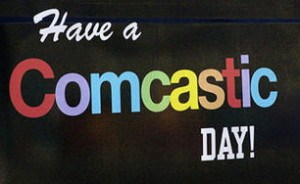Some of Frontier Communications’ 230,000 customers in Oregon are enduring billing snafus after the company accidentally cancelled promotional discounts, resulting in higher bills.
Frontier recently completed a billing system change for those formerly served by Verizon Communications, but The Oregonian reports some customers found bundled service promotions and service contracts established with the former owners suddenly canceled, eliminating discounts that delivered de facto “rate increases” as much as $20 a month.
Frontier had promised customers their “services and pricing plan will remain the same” after the billing system conversion.
Many of the worst-impacted customers subscribe to Frontier’s adopted FiOS fiber-to-the-home service.
Albert, a Stop the Cap! reader with Frontier FiOS, says the “abuse of FiOS customers” has continued since Frontier bought Verizon’s landline and fiber network in the state.
“First they wanted to jack the rates up, then they tried to sell us an ‘upgrade’ to satellite TV, and now it’s just the latest in a series of bill screw-ups from a company that couldn’t run things right if it tried,” Albert tells us. “My contract with the company says ‘no rate hikes while the contract is in effect,’ so they just made it no longer in effect and presto, a rate hike.”
It took four phone calls to straighten things out.
“Frontier’s customer service offices are apparently in other states, and a lot of their people don’t seem to know about FiOS, need supervisors to intervene on everything, and still cannot fix things,” Albert writes. “On the fourth call, I finally got someone who was able to cross-reference my older bills and find the promotion I was supposed to be on, and got me back on it.”
Albert says Frontier really has not offered much to sell people on the company’s fiber optic network.
“Frontier FiOS is a big secret with the company, and the last thing in the world they want to sell you is Frontier FiOS TV,” he reports.
The newspaper reports Frontier’s confusion over promotions and billing have impacted others as well. Some of the problems have prompted customers to file complaints with the Oregon Public Utility Commission (PUC), which says it has seen “a big increase” in consumer issues since Frontier’s billing system changeover.
Frontier promised the state it would not raise any rates in Oregon without notifying the Commission, and so far the company has kept its word. But that doesn’t hold true for Albert.
“Dropping the ball on promotions represents a hidden rate increase, and many people will just pay the bill no matter what it says,” Albert said. “Then Frontier will try the backdoor rate increase with more surcharges and rental fees on other services.”
While Frontier executives have heralded the billing system conversion as a major accomplishment that opens the next chapter on Frontier Communications’ future, some customers are less celebratory.
Oregonian reader Max Gramm:
Frontier is perhaps the worst phone companion in history. Twice now they have changed my account number and never informed me, then refused to apply the money I had continued to pay to the old account number to the bill. I would get bill saying I owed $180 dollars even after proving to them I had made payments every single month. They shut off my service for over a week during one of these disputes. Though part of this could be due to Verizon (when they hear I am from Oregon, I get sent to a different department) Frontier has been absolutely awful to work with.
The newspaper recommends customers check their bills for sudden increases and contact Frontier with any questions. If Frontier has no satisfactory answers, file a complaint with the PUC (800-522-2404 or online).


 Subscribe
Subscribe



